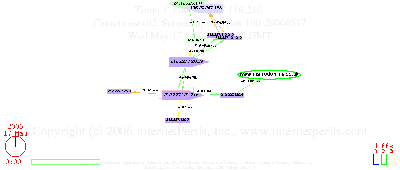A foreign hacker who penetrated security at a Harrisburg, Pa., water filtering plant is under investigation by the FBI for planting malicious software capable of affecting the plant’s water treatment operations, ABC News has learned.The report says this isn’t the first such water supply cracking incident. Continue readingThe hacker tried to covertly use the computer system as its own distribution system for e-mails or pirated software, officials told ABC.
“The concern was high because it is a computer that controls an important infrastructure system, and if, for some reason, it caused it to fail, it would have disrupted service,” said Special Agent Jerri Williams of the FBI’s Philadelphia field office. Hackers Penetrate Water System Computers Richard Esposito, October 30, 2006 3:15 PM
Monthly Archives: October 2006
Mirror Monoculture
Schneier posts irony:
…the problem of agricultural safety and security mirrors the security issues in computer networks, especially with the monoculture in operating systems and network protocols.
Agriculture Security, Bruce Schneier, Schneier on Security, October 20, 2006
I say irony, because of course the concept of monoculture originated in ecology and agriculture, from which it was imported to computing, which Bruce knows as well as anyone else.
Continue readingFaulty Risk Assessment
-jsq
Everything on IP
…in time all global telecommunications will become Internet Protocol (IP) based.I don’t know what’s more remarkable: that someone clearly says what is the case,or that a newspaper got it right. Continue reading…
In his opinion, this industry has spent too much time and energy on creating rules and regulations to govern the use of VoIP as opposed to embracing the technology and developing it and making it available for wider use in the community. Pulver made the point however, that despite these objections, the use of VoIP continued to grow at a rapid pace, and the threat of this wide spread use resulted in telephone companies in the United States dropping to their overseas rates, particularly to their major trading partners.
All telephone communications will become IP based Jeff Pulver, Jeff Pulver Blog, October 23, 2006, quoted from Jeff Pulver: All telephone communications will become IP based By Randy Howard, Barbados Advocate, Mon Oct 23 2006
Logo Security
Quoted by Arthur on Emergent Chaos who found it via Decaf on DeadBeefCafe:
We’re going to buy Mac Minis and run Windows on them because Macs aren’t affected by these security problems.
I think I’m going to stop laughing soon.
Let’s see; we’ll fix the monoculture problem by grafting the vulnerable cotton bolls onto different root stock….
-jsq
Connectors and Mavens, Bloggers and Innovators
Valdis Krebs has taken the ideas of connectors and mavens as described in Malcolm Gladwell’s book, The Tipping Point, and measured and mapped them for a smallish geographic area, northern Ohio. What he’s measured is connections among bloggers and innovators, both separately, and who’s in both networks.
Amusingly enough, the first comment he got was from the most connected connector he measured. Who remarked that he had deliberately tried to build his network of connections this way. Reality imitates art?
I think it would be even more interesting if these connector maps were updated regularly, and animated to show changes over time.
-jsq
25 Years of Internet Mail
Well, it depends on what you count as the beginning of Internet mail, but Sendmail, Inc., naturally counts from when Eric Allman wrote the first version of Sendmail in 1981, and is holding a shindig tomorrow, 25 October 2006 at the Computer History Museum in Mt. View, California.
Of course, Ray Tomlinson beat that by a decade when he implemented the first known networked mail system in 1971, and Tom Van Vleck implemented mail on CTSS at MIT in 1965, as well as Multics mail, about 1969.
But the Internet didn’t exist back then, and at least the experimental Internet did in 1981, so Eric’s got a fair claim on the beginning of Internet mail.
-jsq
Phishing Clusters
Alex Eckelberry blogs about phishing clusters.
Oddly, I’ve heard of this, since it’s InternetPerils that has discovered these clusters of phishing servers.
Continue readingSlowing the Net
TEHRAN (Reuters) – Iran’s internet service providers (ISPs) have started reducing the speed of Internet access to homes and cafes based on new government-imposed limits, a move critics said appeared to be part of a clampdown on the media.If the Internet provides a way to get around the traditional, and already controled, media, find a way to repress the Internet. Slowing it down is easier than censoring it. Continue readingAn official said last week that ISPs were now “forbidden” by the Telecommunications Ministry from providing Internet connections faster than 128 kilobytes per second (KBps), the official IRNA news agency reported. He did not give a reason.
Internet technicians say speeds of 256 KBps, 512 KBps or higher are increasingly common internationally. Iranian surfers will now find it much slower to download music or anything else from the Web. Businesses have not been affected by the move.
Iran cuts Internet speeds to homes and cafes Reuters, Wednesday October 18, 03:41 PM
IE7 Fails Known Test
Danish security company Secunia ApS reported today that IE7 contains an information disclosure vulnerability, the same one it reported in IE6 in April. The vulnerability affects the final version of IE7 running on Windows XP with Service Pack 2.Fortunately, there’s Firefox, and Opera, and Safari.First security flaw signaled in IE7 Peter Sayer, IDG News Service, October 19, 2006
-jsq
